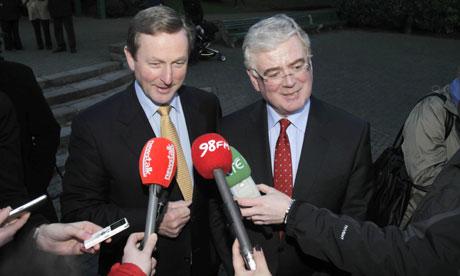All hail the new politics of our septic isle

In the run up to the general election, both Enda Kenny and Eamon Gilmore made a number of promises they have had trouble keeping, writes Vincent Browne.
Enda Kenny and Eamon Gilmore, the two most powerful public servants in the country, made promises on Roscommon hospital in the February election campaign, both guaranteeing to retain existing A&E services and more.
Kenny last week denied that he had made any promises at all.Both claimed that whatever promises they made had been overtaken by new information on safety at Roscommon County Hospital from the Health Information and Quality Authority (HIQA).
Kenny and Gilmore made solemn promises that, in government, they would insist on a renegotiation of the EU-IMF memorandum of understanding, and that they would further insist on sharing the bank losses with senior bondholders.
It has also emerged through Wikileaks that, immediately following the first Lisbon Treaty referendum here in May 2008, Gilmore told the US ambassador that another referendum would have to take place.
At the same time, he was saying publicly that the decision of the people in that first referendum would have to be respected, and that there should be no second vote.
If we had anything by way of a functioning parliament here, these three issues would be investigated by an Oireachtas committee.
Kenny and Gilmore would be required to attend the committee hearings, answer questions, and explain the apparent contradictions between what they said previously and what they said subs e qu e nt ly. It‘s called accountability.
For instance, on the Roscommon County Hospital issue, they could be asked what new information they received about the operation of small hospitals around the country that was not available before the election, when they promised to retain full A&E services in Roscommon.
Were they not aware of a HIQA report on Ennis hospital from some years previously which had clear implications for Roscommon? Did they not know of HIQA’s apprehension about the level of services at such hospitals when they made these promises? At the very least, did their health spokesmen not know?
But there is no chance - whether by the mores of the old politics, or by those of the new politics - that there will be any such accountability.
Any attempt to institute the kind of inquiry that seems obviously appropriate would be voted down by the huge majority the present government has in parliament, through the enforcement of the whipping system.
Even if there were an inquiry, there would be no chance of a critical report by a parliamentary committee, for the whipped government majority on such committees would ensure that did not happen.
When government TD Denis Naughton felt constrained to deliver on a promise that he had made to his electorate on retaining services at Roscommon County Hospital - a promise that his party leader and health spokesman also made - he was expelled from his parliamentary party, by the fiat of that same party leader.
So not alone will the party leader break a promise, but he will penalise any colleague who refuses to break that promise. It’s quite something, isn’t it?
Another feature of the new politics is the dress code.
The whipped government majority is in a position, not just to close down inquiries, to obstruct accountability, to make parliament itself largely irrelevant, but also to tell other members of parliament how they should dress.
They have backed off this in the last few days, but it gives an insight into what this new politics is about.
They wanted to require male TDs to wear business suits, and to bar women from wearing jeans, so as to show appropriate respect to the parliament of the people.
Respect for the parliament of the people apparently requires the wearing of the specific class costumes - no blue collar attire in the Dáil, no dungarees, t-shirts or open shirts.
Respect for parliament has to do with costume, not with what parliament is supposedly about: independently framing legislation, holding the executive arm of the state to account and debating the issues of the day.
There are no debates in the Dáil as there are in, for instance, The House of Commons and the US Congress.
Here, TDs speak to empty chambers, invariably reading from prepared scripts, with nobody responding and nobody listening. Fake debates. There aren’t even fake debates on major issues.
There are nearly nine million people in Somalia and Ethiopia in ‘‘acute livelihood crisis’’, according to Unicef, but that has nothing to do with us.
There are hundreds of millions of people in danger of a livelihood crisis in Europe and around the world, because of the fragility of the bizarre global financial system, notably the debt crisis in Europe.
That certainly has something to do with us, but has there been a Dáil debate on that? A debate on our participation in a financial nexus that is so vulnerable to instability caused by money changers? No.
No debate on the scale of inequality here, or on why so many of our fellow citizens live lives of fear, exclusion and neglect. This new politics stuff is scary.
